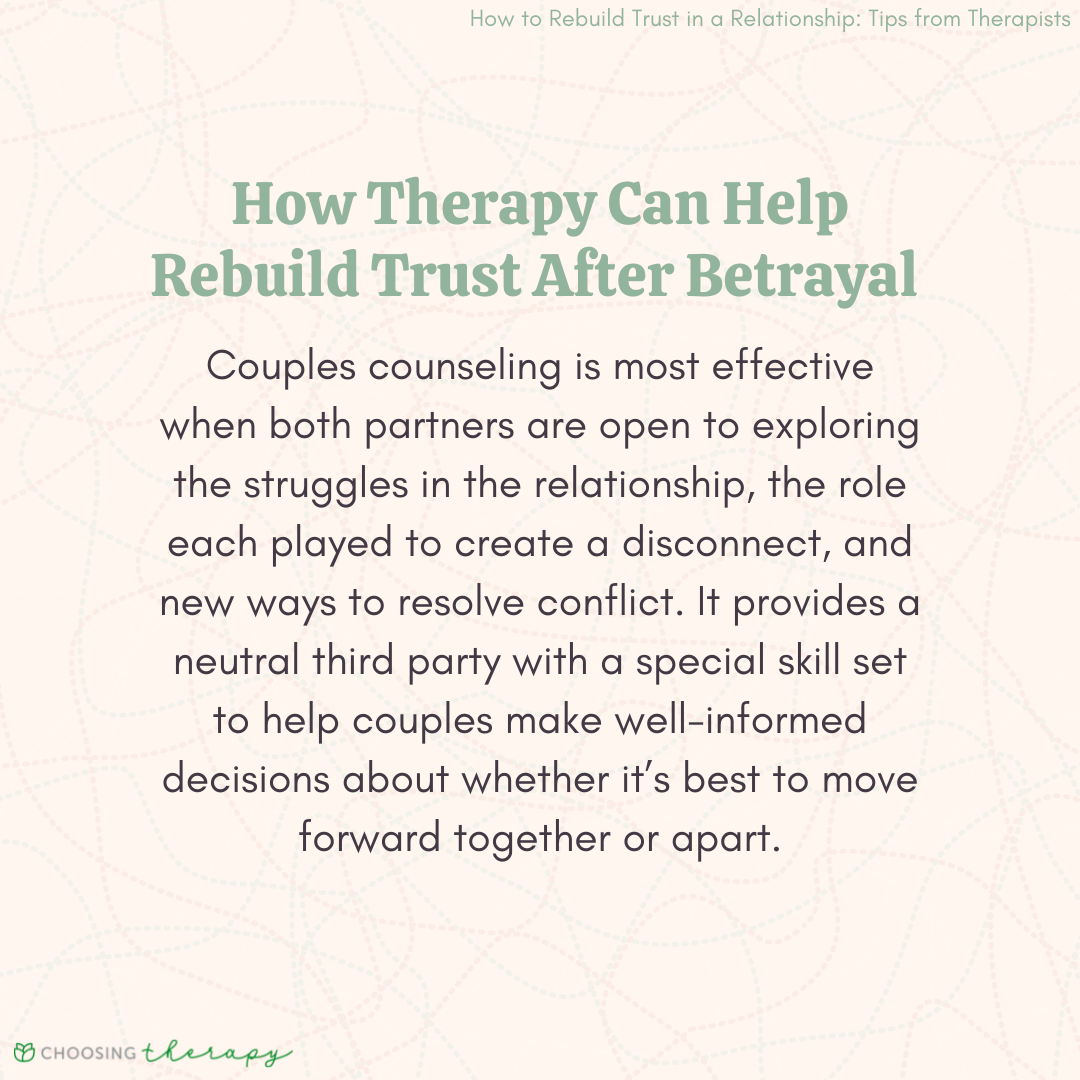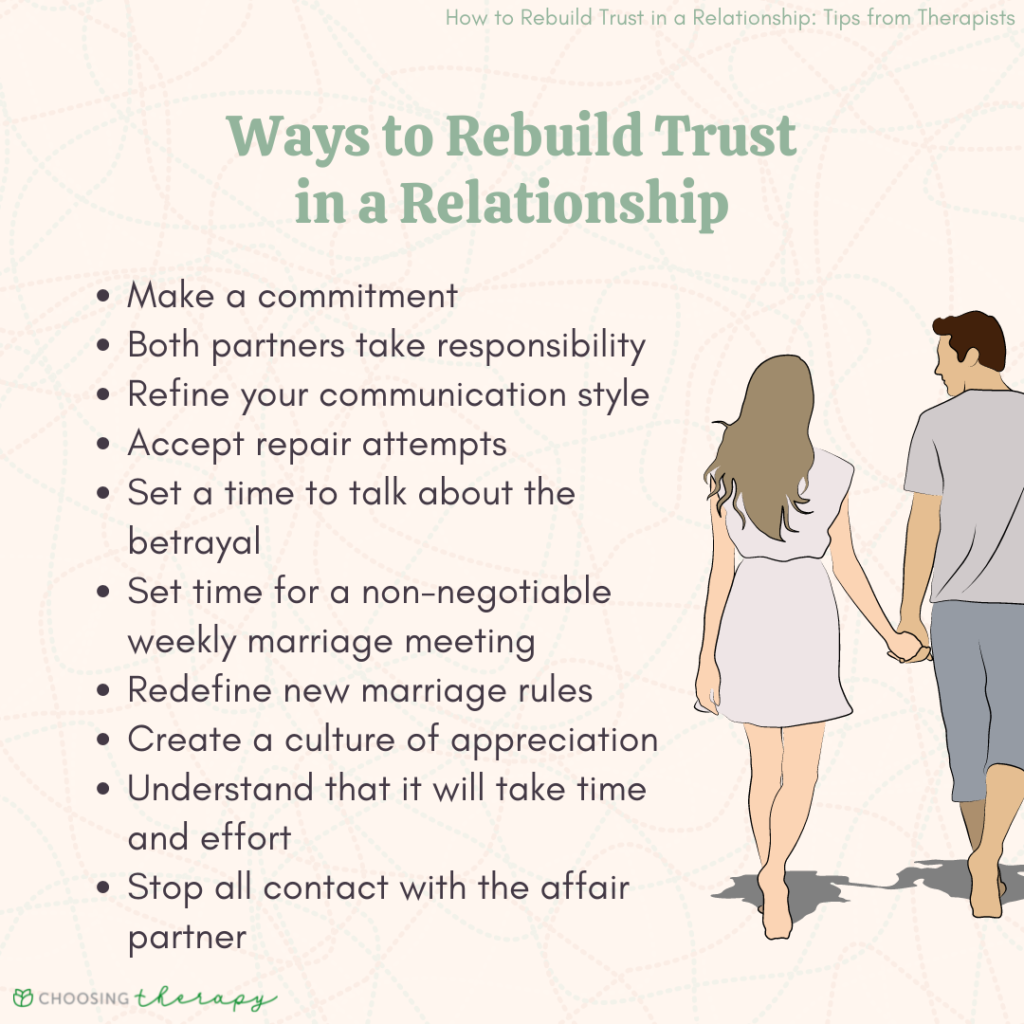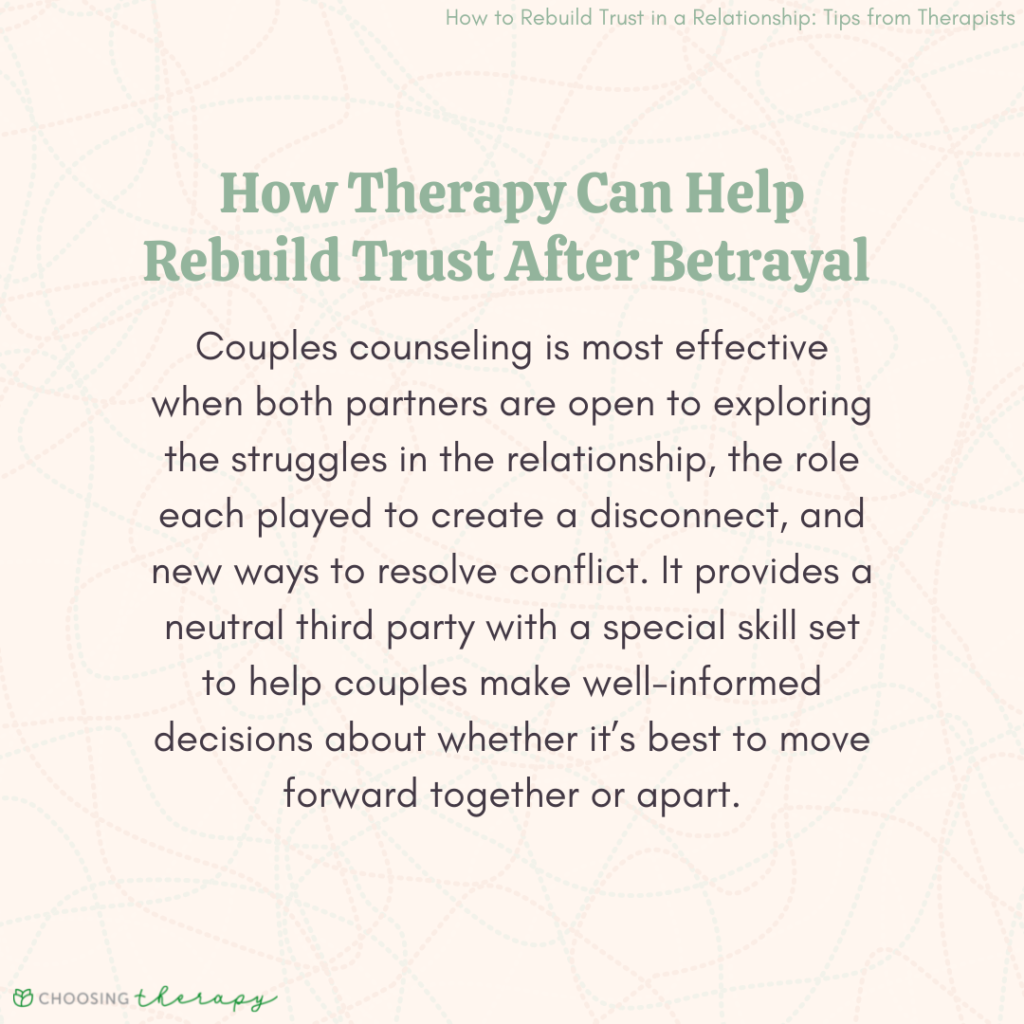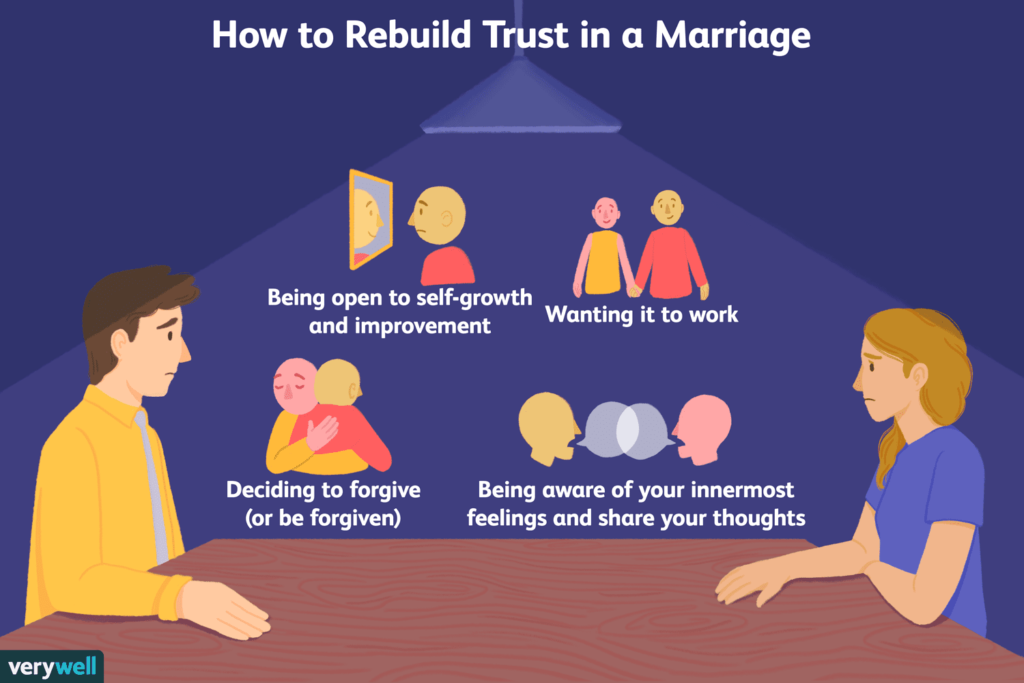
So, you’re faced with a challenging situation: a betrayal has occurred within your relationship. Trust has been shattered, emotions are running high, and you’re left wondering how to navigate this delicate terrain. Rebuilding a relationship after a betrayal can be a daunting task, but it is not impossible. By focusing on open communication, forgiveness, and a willingness to work through the pain together, you can begin the journey of healing and potentially even emerge stronger than before.

This image is property of www.choosingtherapy.com.
Understanding the Impact of Betrayal
Recognizing the Emotions Involved
Betrayal can have a profound impact on a relationship, causing a range of intense emotions. It is important to recognize and acknowledge these emotions to begin the healing process. You may experience feelings of anger, hurt, and deep sadness. It is natural to feel betrayed and question the trust you once had in your partner. Recognizing these emotions and allowing yourself to feel them is the first step towards rebuilding your relationship.
Assessing the Damage
After a betrayal, it is essential to assess the damage caused to the relationship. Betrayal can take various forms, such as infidelity, lying, or breaking promises. Take the time to understand the extent of the damage and how it has affected your relationship. This involves examining the trust that has been broken and understanding the underlying causes of the betrayal. Assessing the damage will provide insight into the steps needed to move forward and rebuild trust.
Accepting Responsibility
Both parties involved in a relationship must accept responsibility for their actions. The one who committed the betrayal must take accountability for their choices and understand the impact it has had on their partner. Equally important, the betrayed individual must accept their own responsibility in the relationship dynamics that led to the betrayal. Accepting responsibility allows for personal growth and creates a foundation for rebuilding the relationship.
Rebuilding Trust
Open and Honest Communication
Rebuilding trust begins with open and honest communication. Both partners must be willing to share their thoughts and feelings without fear of judgment or retribution. It is essential to create a safe space where vulnerability and authenticity can flourish. Engage in active listening and express yourself clearly. This open communication builds the foundation for trust to be restored.
Transparency and Consistency
In rebuilding trust, transparency and consistency are key. The one who betrayed their partner should be open and transparent about their actions, providing reassurance that they are committed to change. Consistency in behavior and actions is crucial to rebuilding trust. By consistently showing up and following through on commitments, trust can gradually be rebuilt.
Setting Boundaries
Establishing clear boundaries is essential in rebuilding trust. Both partners must communicate and agree upon boundaries that will help prevent future betrayals. This could involve setting guidelines for appropriate behavior or establishing open access to each other’s phones and social media accounts. Setting boundaries not only fosters trust but also creates a sense of safety within the relationship.
Showing Genuine Remorse
A vital step in rebuilding trust is demonstrating genuine remorse. The one who betrayed their partner must express sincere apologies for their actions and acknowledge the pain they caused. Genuine remorse involves taking responsibility, expressing empathy, and actively working towards making amends. It is through genuine remorse that trust can begin to be rebuilt.
Rebuilding Through Actions
Trust is restored not just through words but also through consistent actions. It is important for the one who betrayed their partner to actively demonstrate their commitment to change. This could involve attending therapy, engaging in personal growth, and making consistent efforts to rebuild trust. Rebuilding through actions shows the partner that the betrayal was an isolated incident and that steps are being taken to prevent it from happening again.
Patience and Time
Rebuilding trust is a gradual process that requires patience and time. Healing from a betrayal takes time and cannot be rushed. Both partners must be patient with each other as they work towards rebuilding trust. It is essential to celebrate small victories along the way and acknowledge the progress that has been made. Patience and time are key ingredients in allowing trust to be fully restored.
Seeking Professional Help
Counseling or Therapy
Seeking professional help through counseling or therapy is often beneficial in rebuilding a relationship after a betrayal. A trained therapist can provide a safe and neutral environment where both partners can explore their emotions, improve communication skills, and work through underlying issues. Therapy can offer valuable guidance and tools that aid in the healing and rebuilding process.
Individual and Couples Therapy
Individual therapy can be helpful for each partner to address their own emotions and personal growth. It allows for self-reflection, healing, and gaining insight into one’s own actions and motivations. Couples therapy, on the other hand, focuses on repairing the relationship and improving communication. It provides a platform for both partners to express their feelings, work through conflicts, and rebuild trust with the guidance of a professional.
Mediation and Conflict Resolution
If rebuilding trust proves challenging, seeking mediation or conflict resolution services can be beneficial. Mediation involves a neutral third party who helps facilitate open communication and guides the couple in resolving conflicts. It provides a structured approach to address misunderstandings and find common ground. Mediation and conflict resolution can help rebuild trust by creating a safe and productive space for discussions.
Healing and Forgiveness
Processing the Pain
Healing after a betrayal requires actively processing and working through the pain it has caused. It is essential to allow yourself to grieve and express the emotions that arise. This can be done through journaling, talking to a trusted confidant, or engaging in creative outlets such as art or music. Processing the pain is a crucial step in the healing journey.
Letting Go of Resentment
To rebuild the relationship, it is important to let go of resentment. Holding onto resentment can hinder the healing process and prevent trust from being fully restored. This involves practicing forgiveness, both for oneself and for the partner who betrayed. It is important to remember that forgiveness does not mean forgetting or condoning the betrayal, but rather a conscious choice to release negative emotions and move forward.
Practicing Empathy and Compassion
Practicing empathy and compassion towards oneself and the partner who betrayed is essential for healing and rebuilding the relationship. Empathy allows for understanding the emotions and experiences of each other, while compassion fosters a sense of kindness and support. By practicing empathy and compassion, both partners can create a safe and nurturing environment where healing and growth can take place.
Rebuilding Self-Trust
Betrayal can deeply impact one’s self-trust. Rebuilding self-trust involves cultivating self-compassion and self-care. It is important to prioritize personal growth and engage in activities that promote self-esteem and self-worth. By rebuilding self-trust, you can enhance your overall well-being and contribute to the healing of the relationship.

This image is property of www.choosingtherapy.com.
Rebuilding Intimacy
Creating Emotional Connection
Rebuilding intimacy starts with creating an emotional connection. This involves engaging in deep and meaningful conversations, sharing thoughts and feelings, and actively listening to one another. By prioritizing emotional connection, partners can rebuild trust and strengthen their bond.
Rediscovering Shared Interests
Rediscovering shared interests can help reignite the spark in the relationship. Engaging in activities that both partners enjoy can create positive experiences and build new memories together. This shared engagement fosters a sense of closeness and can help in the process of rebuilding intimacy.
Reestablishing Physical Intimacy
Physical intimacy plays a significant role in rebuilding a relationship after a betrayal. Reestablishing physical intimacy requires open and honest communication, trust, and consent from both partners. It is essential to have discussions about boundaries and desires to ensure that physical intimacy is consensual and reaffirming for both individuals.
Building a Stronger Emotional Bond
Rebuilding intimacy is an opportunity to build a stronger emotional bond. Through open communication, honest vulnerability, and a commitment to personal growth, partners can deepen their emotional connection. Building a stronger emotional bond not only rebuilds trust but also enhances the overall strength and resilience of the relationship.
Managing Triggers and Distrust
Identifying Triggers
After a betrayal, certain situations or behaviors may act as triggers, evoking negative emotions and past pain. It is crucial to identify these triggers to prevent further damage to the relationship. By recognizing triggers, both partners can work together to create strategies for effectively managing them.
Developing Coping Strategies
Developing coping strategies is essential in managing triggers and building trust. This could involve practicing relaxation techniques, engaging in self-care activities, or seeking support from a therapist or support group. Coping strategies provide healthy outlets for managing intense emotions and prevent them from negatively impacting the relationship.
Rebuilding Security and Confidence
After a betrayal, rebuilding a sense of security and confidence within the relationship is crucial. This involves consistent actions, open communication, and fostering an environment of safety and trust. By actively working towards rebuilding security, both partners can regain a sense of confidence in the relationship.

This image is property of www.verywellmind.com.
Establishing Accountability
Rebuilding Trust Through Transparency
Transparency is a vital component of rebuilding trust and establishing accountability. Both partners should be open and honest about their actions, feelings, and intentions. Transparency allows for a clear understanding of expectations and helps reduce the risk of further betrayals.
Taking Responsibility for Actions
Establishing accountability requires taking responsibility for one’s actions. The partner who betrayed must acknowledge the harm they caused and actively work towards making amends. By taking responsibility, trust can begin to be rebuilt, and the relationship can move forward.
Setting and Meeting Expectations
Setting and meeting expectations is essential in establishing accountability. Both partners should openly discuss their needs, desires, and boundaries to ensure that they align. By setting clear expectations and actively working towards meeting them, both partners contribute to the rebuilding of trust and accountability in the relationship.
Reevaluating the Relationship
Assessing the Future
After a betrayal, it is important to reassess the future of the relationship. Both partners should have open and honest conversations about their desires, goals, and whether they envision a future together. It is crucial to evaluate if the relationship can fully heal and grow stronger or if it is necessary to part ways.
Identifying Patterns
Reevaluating the relationship involves identifying patterns that contributed to the betrayal. Both partners should reflect on the dynamics and behaviors that led to the betrayal and work towards addressing and changing these patterns. Identifying patterns allows for personal growth and prevents the repetition of past mistakes.
Evaluating Individual Happiness
Individual happiness becomes an important factor in reevaluating the relationship. Both partners should reflect on their own well-being and evaluate whether the relationship contributes to their personal happiness and growth. It is essential to prioritize individual happiness while considering the future of the relationship.

This image is property of www.momjunction.com.
Learning and Growing from the Experience
Reflecting on Lessons Learned
Rebuilding a relationship after a betrayal provides an opportunity for growth and learning. Take time to reflect on the lessons learned from the experience. This could involve self-reflection, seeking therapy, or engaging in personal development activities. Reflecting on lessons learned allows for personal growth and helps prevent similar betrayals in the future.
Identifying Personal Growth Opportunities
Betrayal can serve as a catalyst for personal growth and self-improvement. Identify areas for personal growth and actively work towards them. This could involve setting goals, acquiring new skills, or engaging in activities that promote self-discovery and fulfillment. By embracing personal growth opportunities, individuals contribute to the strength and resilience of the relationship.
Developing Effective Communication Skills
Effective communication is the cornerstone of any successful relationship. Take the opportunity to develop and improve communication skills. This could involve learning active listening techniques, practicing assertiveness, or seeking professional guidance. Developing effective communication skills enhances understanding, reduces conflicts, and promotes trust within the relationship.
Moving Forward
Creating a New Relationship Dynamic
Moving forward after a betrayal requires creating a new relationship dynamic. Both partners should engage in open and honest conversations about their vision for the future, expectations, and boundaries. By creating a new relationship dynamic, both individuals have the opportunity to build a stronger and more resilient partnership.
Rebuilding Mutual Goals and Dreams
Rebuilding trust provides an opportunity to revisit and rebuild mutual goals and dreams. Both partners should discuss their desires and aspirations for the future and identify shared goals. Rebuilding mutual goals and dreams allows for a sense of unity and purpose within the relationship.
Supporting Each Other’s Growth
Moving forward requires supporting each other’s growth and individual journeys. Encourage personal development, celebrate achievements, and provide a space for each partner to pursue their own interests and passions. Supporting each other’s growth fosters a strong and supportive foundation for the relationship to flourish.






